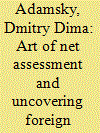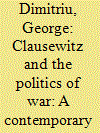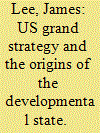| Srl | Item |
| 1 |
ID:
173419


|
|
|
|
|
| Summary/Abstract |
Andrew W. Marshall, who shaped the way in which contemporary international security experts think about strategy, has been mostly associated with the invention of net assessment. The intellectual sources of this analytical technique, and of the related competitive strategies concept, could be traced to Marshall’s efforts to uncover Soviet post-World War II defense transformations. This article outlines the essence of these Soviet innovations – the empirical frame of reference that inspired Marshall. It provides a new perspective on the history of the net-assessment methodology, advances the debate within strategic studies over the nature of military innovations, and offers insights for experts examining defense transformations worldwide.
|
|
|
|
|
|
|
|
|
|
|
|
|
|
|
|
| 2 |
ID:
173420


|
|
|
|
|
| Summary/Abstract |
This paper re-examines the theoretical underpinnings of Strategic Studies, proposing a novel theory and a new framework for analysing war’s fundamental relationship with politics in line with the Clausewitzian tradition. Throughout modern history, Clausewitz’s concept of politics has been misconstrued as referring only to policy whereas in fact, for him, ‘politics’ was a much broader concept, including domestic power struggles. The political logic of war is defined here as the convergence of the interrelating factors of power struggles and policy objectives within a given polity that restrains and enables these political forces. The analysis of the Clausewitzian political logic of war is conducted through the sociological ‘liquid modern’ lens. It is argued that with power increasingly shifting from centralised state-oriented political leadership towards market forces, non-state actors and other political bodies, the effectiveness of war has been reduced. This is evident in the fragmentation of Western political systems and, as a result, suboptimal strategy and the domination of domestic power struggles in political decision-making concerning war.
|
|
|
|
|
|
|
|
|
|
|
|
|
|
|
|
| 3 |
ID:
173422


|
|
|
|
|
| Summary/Abstract |
Military doctrine assures a nation’s survival. Yet even when faced with a security threat that requires change, militaries rarely innovate but instead adhere to old doctrines that enhance autonomy, reduce uncertainty and claim resources. Existing theories cannot explain an important case of peacetime military innovation when the U.S. Air Force adopted Battlefield Air Interdiction to support the Army’s AirLand Battle doctrine. A revised theory of peacetime military innovation through inter-service cooperation resulting from external and internal threats explains not only why innovation occurred with Battlefield Air Interdiction but also why such successful cases are so rare.
|
|
|
|
|
|
|
|
|
|
|
|
|
|
|
|
| 4 |
ID:
173421


|
|
|
|
|
| Summary/Abstract |
The strategic culture approach has been suffering from a prolonged theoretical stalemate, despite a surge in case studies, which culminated in the Johnston-Gray debate and subsequent schism. The present paper outlines a new approach designed to overcome this deadlock, and consists of three arguments. First, the three previous generations of strategic culture studies have failed to explain how strategic culture influences behaviour. Second, aligning strategic culture theory-building with discursive institutionalism offers a way to overcome this fundamental fallacy. Third, a research programme for strategic culture should draw on computational social science to enable it to present and test middle-range theories.
|
|
|
|
|
|
|
|
|
|
|
|
|
|
|
|
| 5 |
ID:
173423


|
|
|
|
|
| Summary/Abstract |
Scholars have credited a model of state-led capitalism called the ‘developmental state’ with producing the economic miracles of Japan, South Korea, and Taiwan. This article examines how the developmental state was shaped by the Cold War. US grand strategy focused on accelerating economic development among allies that were under the greatest threat from Communist China and North Korea. American aid agencies became involved in the process of state-building in Japan, South Korea, and Taiwan and supported economic planning. I verify this claim by contrasting US policies on Taiwan with US policies in the Philippines, which faced a weaker Communist threat.
|
|
|
|
|
|
|
|
|
|
|
|
|
|
|
|